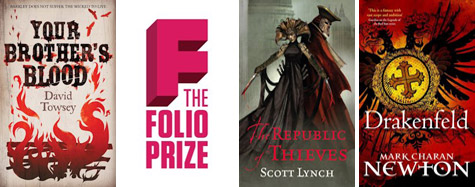Welcome back to the British Genre Fiction Focus, Tor.com’s weekly column dedicated to news and new releases from the United Kingdom’s thriving speculative fiction industry.
This time last week, I was gearing up to pop off on a short holiday. And pop off I did! To the Isle of Skye on the west coast of Scotland, where I celebrated a belated birthday—mine—drank some excellent ale—the Black Cuillin—and read a few phenomenal novels—The Machine by James Smythe and River of Stars by Guy Gavriel Kay. But you know what I didn’t do? What I couldn’t? Check the internet.
It’s a strangely freeing thing, to be without the web for a week. For a long moment, you miss it. Then you learn to luxuriate in the lack. That said, it’s not bad to be back. To have my RSS feeds at my fingertips again, and access to email… it’s a fine feeling indeed.
And I’ve missed so much! Announcements, of both books and tours. News of a new award for novels to rival Great Britain’s biggest literary prize—an award which looks to be more open to genre fiction from the first than the high and mighty minds behind the Booker have ever been. Stay tuned too for an extravaganza of cover art and a rundown of notable new releases, this week featuring books by Brandon Sanderson, Peter Higgins, Lauren Oliver, Mike Carey and many other authors.
But we begin with an item that caught yours truly entirely by surprise….
NEWS
Release The Republic of Thieves!
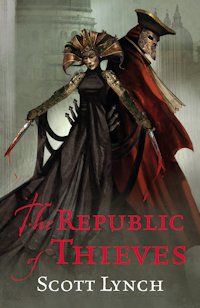
Slight as it might seem to some—namely the uninitiated—this week’s biggest news has to be the announcement of a revised release date for The Republic of Thieves by Scott Lynch.
Are you ready for this, folks?
The promised novel will be upon us on… October 10th, 2013.
That’s this year! Which I confess I had not expected. But then, The Republic of Thieves has been pushed back again and again—for serious: it’s been nearly six years since our last dalliance with the Gentlemen Bastards—such that I warrant I was not alone in feeling mostly unmoved when the last delay was acknowledged.
The Republic of Thieves has had more than its fair share of publication dates before, of course, but this one sounds like a dead cert, as the man himself said to Fantasy Faction:
My publishers and I have been sitting on some news for about a week and a half now, and I’ve been ready to spontaneously combust from keeping quiet. Which is, I suppose, a small cosmic justice for the fact that everyone else has had to wait five and a half years to find out what happens next for Locke Lamora.
[…]
I have been open elsewhere about the nature of the delays in the writing of this book; it’s been a difficult and occasionally ugly span of time, and while everything has brightened considerably in the last year or so, it’s hard not to feel that depression and anxiety have stolen a chunk of my life outright, a chunk I would have preferred to use giving you more books. But it is what it is, and I like to think that there is some compensation: the version of The Republic of Thieves you’ll get is a tighter, more carefully considered, and (or so I flatter myself) more mature version than anything I might have handed in before.
Or so my cat tells me, and the voices in my head agree. And if you can’t trust the voices in an author’s head, who can you trust?
Who indeed….
I feel cautiously optimistic about this. The Lies of Locke Lamora was a wonderful novel, and though I thought the sequel, Red Seas Under Red Skies, was substantially less impressive, The Republic of Thieves has clearly been painstakingly created, and I’m glad to get behind a labour of love.
Then again, the sheer weight of expectation for this book could prove crushing. Or has it been so long since the last volume that we’ve forgotten what we want from a Gentlemen Bastards book?
Whatever happens, I’m happy to hear the author is feeling better—about life in general and the literary life in particular. Welcome back, Mr. Lynch!

The Folio Prize for Fiction
Speaking of the literary life, the pieces of a major new award for “the outstanding books of our era” fell into place lately. Though we’ve known that there was something coming since late 2011, when Andrew Kidd and his associates first mentioned the prospect of a more progressive mainstream prize for fiction, we’ve only just been made aware that the Folio Society will be backing it.
Certain other details emerged in Kidd’s explanation of the award, but before we address those, a word from the founder of the new-fangled Folio Prize:
So we have launched a new literary prize: the Folio prize for fiction, which will be awarded annually, in early spring, for an English language book published in the UK in the previous calendar year. When my co-founders and I first announced our intentions, in the autumn of 2011, they caused quite a stir, and we were surprised at the volume of noise generated by a single, speculative press release. On the other hand, the response seemed to verify what we had long suspected: that there was an appetite for a new initiative aimed at bringing outstanding books to public attention and, more simply, that storytelling—whether linear or fragmented, naturalistic or fantastical, historical, contemporary or futuristic—still matters to people.
There are, of course, already a lot of prizes. Some—and above all, the Man Booker prize—have been hugely and admirably successful in connecting books with readers and stimulating lively cultural debate. But we do believe there is room for a new sort of prize: a 21st-century prize based on 21st-century parameters; a prize open to English language writers from anywhere in the world; a prize open to all forms of fiction, even forms of which we’ve scarcely yet conceived; and a prize that engages directly with those most invested in helping deserving books to find an audience: the writers themselves.
To that end, shortlists will be selected by a “group of more than 100 distinguished authors and critics,” including China Mieville, Michael Chabon, David Mitchell, Hari Kunzru, Philip Pullman, and Margaret Atwood. Five judges will then be drawn from that lot to pick a single winner each year.
Now correct me if I’m wrong here, but this is a good thing, isn’t it? There can be no question that the involvement of even a handful of genre authors (or authors who obviously have respect for the genre) in the process is better than the alternative offered by the Booker. Sure, it’d be nicer still if they made up a greater percentage of the Folio Prize Academy, as Kidd calls it, but better some representation than none.
The aforementioned founder even goes so far as to specifically include “fantastical” fiction in his description of the novels eligible for the annual award. Can’t we be glad of that, rather than lamenting some perceived lack?
Apparently not. The reaction to this promising announcement has been… mixed, to put it politely. Just check the comments on the originating article in The Guardian.
What a lot of negativity! A few facts have been misconstrued, too.
But rest easy… we won’t get into that here. Instead, let’s end this item on a nicer note. Here’s Kidd again:
The books that go off with the loudest bang when they first appear will often, after just a few years, emit barely a whimper. By contrast, other books have been overlooked for decades, the magnitude of their achievement only becoming clear long after the deserving but unlucky writer has died. Looked at fatalistically, we might well say, “What will be will be.”
Yet what if some of those hidden gems might be spotted now? Of course, it would be preferable for the writers themselves, since they would receive recognition when they were still around to enjoy it. But most exciting of all would be to bring those gems to legions of readers who might not otherwise find them. While we make no claims for the infallibility of the Academy, we would like to think they might give more such books, and their authors, a fighting chance.
I for one welcome this news.
Do you?
Cover Art Corner: Drakenfeld, Arcanum, and Your Brother’s Blood
Moving on to lighter matters, this week saw the unveiling of a number of interesting covers. First of all, Orbit Books went all out, releasing a massive batch of art in one beautiful swoop, but of particular interest to the British Genre Fiction Focus is Arcanum by Simon Morden, author of the excellent Metrozone series.

The book’ll be out in Britain this November. Till then, the following synopsis should tide you over:
Carinthia: a kingdom of great influence, power—and formidable magic.
Long has the kingdom of Carinthia relied upon the spells of its Hexmasters to maintain its position of control. The great Prince Gerhard has ruled benignly over a kingdom that’s never had to change for a thousand years. But now there are signs that their magic is failing, and the kingdom lies vulnerable to attack from all sides.
Some Carinthians would do anything to see the magic return: any act, no matter how terrible, is justified, so long as the Hexmasters can still cast spells to protect their homeland.
The kingdom is poised between chaos and order—and the smallest push is the distance between disaster and triumph.
In advance of Arcanum, if only slightly, Drakenfeld by Mark Charan Newton is due in October from Pan Macmillan.
It looks to be a very different book than any of the four volumes of the Legends of the Red Sun saga, and I’m deeply keen to see how the author builds on his experience with that underappreciated series.
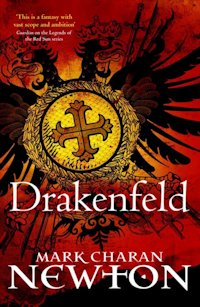
The cover surely looks good. Meanwhile, here’s a rather wordy blurb:
“I am Lucan Drakenfeld, second son of Calludian, Officer of the Sun Chamber and peace keeper. Although sometimes it seems I am the only person who wishes to keep it…”
The monarchies of the Royal Vispasian Union have been bound together for two hundred years with treaties and laws maintained and enforced by the powerful Sun Chamber. As a result, a long harmony has existed, nations have flourished, and civil wars are a thing of the past. But corruption, deprivation and murder will always find a way to thrive…
Upon receiving news of his father’s death and recalled to his home city of Tryum, Drakenfeld is soon embroiled in a mystifying case. King Licintius’ sister, Lacanta, has been found brutally murdered during a night of festivities—her beaten and bloody body discovered in a locked temple. Despite hundreds of revellers, no one saw anything. With rumours of dark spirits and political assassination, Drakenfeld soon has his work cut out for him trying to separate superstition from certainty.
With his assistant, Leana, he embarks on the biggest and most complex investigation of his career, revisiting the ancient streets of his past, tracking down leads, interviewing suspects and making new enemies in his search for the truth.
His determination to find the killer soon makes him a target, as the underworld of Tryum focuses on this new threat to their power….

Your Brother’s Blood by David Towsey is the last contender in Cover Art Corner this week, and this is what it’s all about:
It has been nine hundred years since man last used machines. Technology, science and medicine have been forgotten, leaving in their wake a twisted legacy: the Walkin’. The disease is passed down from generation to generation; it causes men, women and children to live on after death.
In these turbulent times a community seeks isolation. Their plain existence is based on an incomplete copy of the Bible and the teachings of John Sebastian Barkley, town founder. Following his example, they burn the bodies of their dead to stop them from living again. Except that doesn’t always happen…
Thomas McDermott has died. A man of Barkley, he should have been burnt on a funeral pyre, but instead, he wakes from his death. Torn between the desire to see his wife and daughter, and the shame of what he has become, he travels to Barkley—but his return endangers everything and everyone he once loved.
Jo Fletcher Books will publish book one of The Walkin’ in the UK this August, and they’ve made any number of encouraging comparisons since its announcement: to The Road, The Passage and The Sisters Brothers, amongst others. If Your Brother’s Blood lives up to just one of those genre watermarks, it’ll be worth the buy-in, I bet.
Look Out For The Lowest Heaven
One of the books I took on holiday with me last week was A Town Called Pandemonium, which I’ve been reading for a future edition of the Short Fiction Spotlight. I’m not quite finished with its weird and wonderful treatment of the wild west as yet, but the experience has been superb so far… diverse, disturbing and indubitably daring.
For me, then, the announcement of Jurassic London’s next anthology came at exactly the right time. But say I hadn’t been knee-deep in A Town Called Pandemonium… say I’d heard the news with no notion of the incredible things this not-for-profit small press has achieved since its inception a few short years ago: I’d still be putting my money where my mouth was, because The Lowest Heaven sounds simply stellar.
Here’s how Jared Shurin introduced the project on Pornokitsch:
We are delighted to announce The Lowest Heaven, a new anthology of contemporary science fiction published in partnership with the Royal Observatory Greenwich to coincide with Visions of the Universe, their major new exhibition of space imagery.
Each story in The Lowest Heaven is themed around a body in the Solar System, from the Sun to Halley’s Comet. The stories are illustrated with photographs and artwork selected from the archives of the Royal Observatory, while the book’s cover and overall design are the work of award-winning illustrator Joey Hi-Fi.
[…]
We’re happy… no… elated. Amazing writers, astounding partner, incredible photography, Joey Hi-Fi and simply some of the best science fiction we’ve ever read. This collection is definitely more literary than operatic, although there are some cheeky nods to the classics of the genre, these are contemporary, character-focused stories, with more than bit of edge to them. Science fiction’s oldest inspirations, our closest celestial neighbours—just as relevant today as they ever were.
(Also, robots, rockets and space monsters. Because.)
Exactly!
Now as interested as I am in the high concept behind The Lowest Heaven, the list of contributors appeals to me even more. A positively stonking assortment of authors will be represented in the next collection to come from Jurassic London, including—deep breath—Adam Roberts, Alastair Reynolds, Maria Dahvana Headley, Jon Courtenay Grimwood, Kaaron Warren, Lavie Tidhar, Kameron Hurley, James Smythe and S. L. Grey.
Both Simon Morden and Mark Charan Newton from this week’s Cover Art Corner have submitted stories too.
You don’t think that’s it, do you? Well it ain’t. But better that you read through the whole table of contents on this Pandemonium page rather than suffer me repeating it here.
Both the physical and the digital editions of The Lowest Heaven are coming on out June 13th. Mark your calendars accordingly.
Where Art Thou, NOS4R2?
Let’s finish off the first half of this week’s British Genre Fiction Focus as we started, with another nugget of news from the tireless Gollancz camp: of a UK tour by the one and the only Joe Hill, whose massive new novel, NOS4R2—or NOS4A2, as it’s known in North America—will be hitting the States at the end of April, and here a little later.
Rather resembling Peter V. Brett’s tour of the UK—reported on in an earlier edition of this column—Hill is mostly going to be visiting England; six of the seven signings will be there, I’m afraid. But I’m in luck this time around, because the penultimate event will be held in Edinburgh. Which is to say… wahey!
If that’s a little ways away from where you’re based, and presuming the luck of the Irish isn’t working against you for once, take your pick from dates in Reading, Bristol, Manchester, Liverpool, or London.
Almost all of this is all happening in late May, by the way. The Gollancz Blog has all the details you’ll need to book a ticket to one talk or another.
So do you think you’ll make any of the dates?
Let me know if you’re planning on attending the Edinburgh event and I’ll tell you where they keep the best beer!
Now then. Let’s get our new releases on….
NEW RELEASES
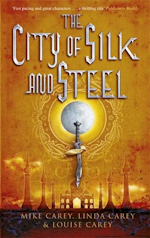
The City of Silk and Steel, by Mike Carey, Linda Carey & Louise Carey (March 21, Gollancz)
Once, in a city known as Bessa, there was a sultan named Bokhari Al-Bokhari, who was thrown down by the zealots of the ascetic Hakkim Mehdad. The sultan, his wives and children were put to the sword, while his 365 concubines were sent to a neighbouring caliph as tribute, Hakkim having no use for the pleasures of the flesh.
But a day after the caravan had departed from Bessa, Hakkim discovered the terrible secret that the concubines had hidden from him.His reaction was swift and cruel.
Kill the women of the harem forthwith, along with their children and maidservants. Let not one survive. Their bodies let the desert claim, and their names be fed to silence.
This, then, is the tale—or tales—of how a remarkable group of women fight together to survive both the fury of Hakkim and the rigours of the desert. It is the tale of Zuleika, whose hidden past holds the key to their future, and of Rem, the librarian whose tears are ink. Of the wise Gursoon, who defines the group’s conscience, and of the silver-tongued thief, Anwar Das, who knows when to ignore that conscience.
This is the tale of the forging of a rabble of concubines, children, camel-herds and thieves into an army of silk and steel. It is the tale of the redemption and rise of Bessa, fabled City of Women. And it is the tale of an act of kindness that carries the seed of death, and will return to bring darkness and the end of a dream…

The Emperor’s Soul, by Brandon Sanderson (March 21, Gollancz)
From the bestselling author of the Mistborn trilogy and co-author of the final three books of Robert Jordan’s Wheel of Time series comes the tale of a heretic thief who is the only hope for the survival of an empire.
Shai is a Forger, a foreigner who can flawlessly copy and re-create any item by rewriting its history with skillful magic. Though condemned to death after trying to steal the emperor’s sceptre, she is given one opportunity to save herself. Despite the fact that her skill as a Forger is considered an abomination by her captors, Shai will attempt to create a new soul for the emperor, who is almost dead from the attack of assassins.
Skillfully deducing the machinations of her captors, Shai needs a perfect plan to escape. The fate of the empire lies in one impossible task. Is it possible to create a forgery of a soul so convincing that it is better than the soul itself?
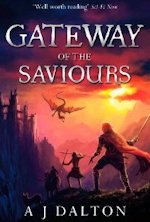
Gateway of the Saviours (Chronicles of a Cosmic Warlord #2), by A. J. Dalton (March 21, Gollancz)
Jillan and his companions have won the battle of Godsend, and an uneasy peace has settled on their remote corner of the Empire. But the Saviours cannot allow such resistance to go unpunished, and embark on a series of punitive assaults on the few who have rejected their reign. With his friends scattered and his reason for fighting taken away from him, Jillan is faced with new and terrible decisions to make.
Tasked by the God of Mayhem to find the location of Haven, the source of all power in the world, Jillan embarks on a new journey, terrifingly aware that he leaves his hometown undefended. Unsure of his fellow travellers, barely in control of his magic, tied to a destiny he is only beginning to understand, things have never seemed bleaker.
And in another realm, at another time, on another planet, the Declension watch. Their servants, the Saviours, have failed. The God of Mayhem is loose. A young boy with remarkable powers is on his way to Haven, where he may find a way to destroy them. A renegade member of their race is rampaging through their realms.
Everything is going to plan.

Requiem (Delerium Trilogy #3), by Lauren Oliver (March 21, Hodder & Stoughton)
It is the rule of the Wilds. You must be bigger, and stronger, and tougher.
A coldness radiates through me, a solid wall that is growing, piece by piece, in my chest. He doesn’t love me. He never loved me. It was all a lie.
“The old Lena is dead,” I say, and then push past him. Each step is more difficult than the last; the heaviness fills me and turns my limbs to stone.
You must hurt, or be hurt.

The Science of Monsters, by Matt Kaplan (March 21, Constable)
Modern audiences do not find dragons frightening. Fascinating as mythical creatures, yes, but terrifying, no. Yet, present them with a story about a virus that can kill a healthy adult in hours and they will have nightmares for weeks. The difference between the two is believability. Monsters are at their most frightening when they carry characteristics that tie them to the real world in some way.
Preposterous as they might seem today, dragons were no different in ancient times. Humans long ago stumbled upon skeletons that had sharp teeth and talon-like claws. These fossils were real and some were frighteningly large. Those who looked at them could only guess at how dangerous the animals that they belonged to must have been. From such interactions, dragons were born. Yet, in spite of ample physical evidence that dragons existed, none were ever seen in the flesh. Dragon bones were ultimately proven to be the bones of huge predatory dinosaurs like Tyrannosaurus Rex, but before the mystery was solved, they were the makings of frightening beasts that managed to evade human sight by lurking deep within the shadows of the wild.
The Science of Monsters will explore monsters that have haunted humanity throughout the ages, from Medusa to sea serpents, giants, and vampires. In each chapter Kaplan uses scientific principles, current research, and his thorough knowledge of the natural world to explain why specific monsters came to be and what it was about them that was so terrifying to the people who brought them to life.

Under Wildwood (Wildwood #2), by Colin Meloy & Carson Ellis (March 21, Canongate)
Ever since Prue McKeel rescued her brother from the malevolent Dowager Governess and returned home from the Impassable Wilderness, life has been pretty dull. Prue’s mind is constantly returning to the verdant groves and sky-tall trees of Wildwood, where her friend Curtis remains as a bandit-in-training.
But all is not well in that world. A hard winter has come and discord reigns. Dark assassins with mysterious motives conspire to settle the scores of an unknown client. A titan of industry employs inmates from his orphanage to work in his machine shop, all the while obsessing over the exploitation of the Impassable Wilderness.
Under a growing threat, Prue is drawn back into Wildwood, where she and Curtis will face their greatest challenge yet: to save themselves and the lives of their friends, and to bring unity to a divided country. In order to do that, they must go under Wildwood.

Wolfhound Century, by Peter Higgins (March 21, Gollancz)
A thousand miles east of Mirgorod, the great capital city of the Vlast, deep in the ancient forest, lies the most recent fallen angel, its vast stone form half-buried and fused into the rock by the violence of impact. As its dark energy leeches into the crash site, so a circle of death expands around it, slowly—inexorably—killing everything it touches. Alone in the wilderness, it reaches out with its mind.
The endless forest and its antique folklore are no concern to Inspector Vissarion Lom, summoned to the capital in order to catch a terrorist—and ordered to report directly to the head of the secret police. A totalitarian state, worn down by an endless war, must be seen to crush home-grown terrorism with an iron fist. But Lom discovers Mirgorod to be more corrupted than he imagined: a murky world of secret police and revolutionaries, cabaret clubs and doomed artists. Lom has been chosen because he is an outsider, not involved in the struggle for power within the party. And because of the sliver of angel stone implanted in his head at the children’s home.
Lom’s investigation reveals a conspiracy that extends to the top echelons of the party. When he exposes who—or rather what—is the controlling intelligence behind this, it is time for the detective to change sides. Pursued by rogue police agents and their man-crushing mudjhik, Lom must protect Kantor’s step-daughter Maroussia, who has discovered what is hidden beneath police headquarters: a secret so ancient that only the forest remembers. As they try to escape the capital and flee down river, elemental forces are gathering. The earth itself is on the move.
POSTSCRIPT
So what will you be reading this week?
I feel fairly spoiled for choice. First and foremost, I’ll be reading the remainder of A Town Called Pandemonium, but after that, I’m going to be all over Wolfhound Century, in large part because people keep saying Peter Higgins’ name in the same breath as mentioning China Mieville.
If I find myself at leisure for a little longer, I’ll take in the new Brandon Sanderson, too. And whether or not I get to it this week, I’ll absolutely study The Science of Monsters by Matt Kaplan at some stage; it sounds absolutely fascinating… and it has been an age since I sank my teeth into some proper non-fiction.
And that’s this edition of British Genre Fiction Focus. Please do continue the conversation in the comments, but one way or the other, we’ll talk again next Wednesday!
Niall Alexander is an erstwhile English teacher who reads and writes about all things weird and wonderful for The Speculative Scotsman, Strange Horizons, and Tor.com, where he contributes a weekly column concerned with news and new releases in the UK called the British Genre Fiction Focus, and co-curates the Short Fiction Spotlight. On rare occasion he’s been seen to tweet about books, too.










